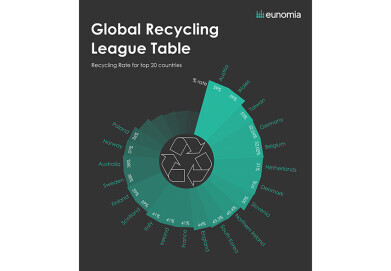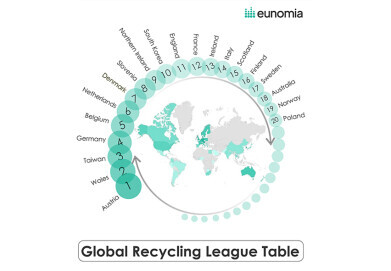Waste management
Austria, Wales & Taiwan leading the world when it comes to rates of recycling
Jun 10 2024
A new study by Eunomia Research and Consulting, in collaboration with Reloop, has highlighted the world’s top recyclers. Published on 5th June 2024, Austria was identified as the best country for recycling. Wales leads the UK, securing the second spot, followed by Northern Ireland at ninth, England at eleventh, and Scotland at fifteenth among the 48 countries compared.
The 'Global Recycling League Table - Phase One Report' assesses the recycling performance of various countries, focusing on municipal waste. This includes household waste and similar waste types. The report, available at Eunomia's website, was released to mark World Environment Day and was funded by TOMRA, The Welsh Government, International Aluminium Institute, and the Can Manufacturers Institute in collaboration with Reloop.
The top 10 performing countries are:
1. Austria - 59%
2. Wales - 59%
3. Taiwan - 53%
4. Germany - 52%
5. Belgium - 52%
6. Netherlands - 51%
7. Denmark - 51%
8. Slovenia - 50%
9. Northern Ireland - 45%
10. South Korea - 45%
The report found that the best recyclers do not exceed a 60% recycling rate for municipal waste. Eight of the top ten are in Europe, predominantly Western Europe, reflecting extensive investments in recycling infrastructure. Taiwan and South Korea, the exceptions, also have well-established systems. This underscores the importance of long-term investments and cultural norms in recycling.
Significant drops in reported recycling rates were noted for Singapore, South Korea, Spain, and Germany, while China and South Africa saw improvements. Wales’ high performance is attributed to its 'Towards Zero Waste' strategy from 2010, setting escalating recycling targets backed by financial penalties.
The study also examined beverage container recycling, revealing no strong correlation between consumption and recycling rates. Countries with high municipal recycling rates generally performed well in beverage container collection, but major consumers like the US and Australia had low recycling rates for these containers.
High-performing countries share several features:
• A formal waste and recycling strategy with clear targets.
• Separate collection of recyclables, including organics.
• Funding mechanisms based on the "polluter pays" principle.
• Financial and behavioural incentives to encourage recycling.
Lower income countries in Latin America, Africa, and the Middle East had the lowest performance, often relying on informal sectors for waste management, which affected data accuracy.
Recommendations for all countries include improving municipal waste reporting, adopting practices from high-performing countries, and formalising informal recycling sectors to improve health, environmental standards, and data accuracy.
Joe Papineschi of Eunomia emphasized the importance of understanding global recycling performance to track progress toward a circular economy. The First Minister of Wales, Vaughan Gething, celebrated Wales' achievement, attributing success to collective efforts and setting sights on becoming the top recycler globally.
Tove Andersen of TOMRA highlighted the need for specific targets and international standardization for effective recycling. Scott Breen from the Can Manufacturers Institute and Marlen Bertram from the International Aluminium Institute discussed the significance of high recycling rates for metal beverage cans and the industry's commitment to improving these rates.
Events
May 11 2025 Vienna, Austria
May 18 2025 Algiers, Algeria
23rd International Water Management Exhibition
May 20 2025 Prague, Czech Republic
Singapore International Water Week Spotlight 2025
Jun 23 2025 Singapore
Jun 25 2025 Sao Paulo, Brasil

















